Judge to rule if some Kansas votes count in November

TOPEKA, Kan. (AP) — A voting rights group asked a judge on Wednesday to force Kansas Secretary of State Kris Kobach to count all votes cast in local and state elections this November.
Kobach wants to toss potentially thousands of votes cast by people who registered at motor vehicle offices or used a federal registration form, and didn't immediately provide proof of U.S. citizenship.
Shawnee County District Judge Larry Hendricks temporarily blocked Kobach from discarding those votes for the August Kansas primary, but a hearing on Wednesday considered whether to extend the order to the November election.
The case stems from a lawsuit in July by the American Civil Liberties Union on behalf of three prospective voters who registered while getting their driver's licenses without providing proof of U.S. citizenship. ACLU lawyers argued on Wednesday that all voters who registered this way should have their votes counted even if they didn't provide the citizenship documents. Kansas is one of four states that have passed laws requiring proof of citizenship to register to vote.
The courts are deciding whether to require Kansas to count those votes in state and local races after a federal judge had already ruled in May that Kobach must count those votes cast in federal races, such as for president and U.S. senator. A court of appeals agreed with that ruling.
Kansas says that 18,611 people registered to vote by Sept. 1 at motor vehicle offices without providing citizenship papers. About 50,000 could be affected by the time of the November election. The state said just 73 of the affected voters actually cast a ballot in the Kansas primary election.
In another lawsuit on Kansas voting laws, the U.S. Court of Appeals for the District of Columbia blocked Kansas, Georgia and Alabama from requiring residents to prove they are U.S. citizens when registering to vote for federal elections using a national registration form.
That ruling is expected to affect fewer than 200 voters in Kansas who registered using the federal form.
Hendricks' decision in the case being argued Wednesday will cover both those categories of voters — those who registered at motor vehicles offices and those who used a federal form— and did not provide proof of citizenship.
Kansas residents who did not register in those two ways will still have to provide citizenship documents to register to vote. The League of Women Voters said Tuesday that as of August Kansas had purged the registrations of about 6,570 prospective voters, most of them for not providing the documents within 90 days.
Kobach, a conservative Republican, has championed the proof-of-citizenship requirement as a way to prevent fraud by people in the country illegally. Critics contend such fraud is rare. They also say the requirement suppresses turnout because eligible citizens may not be able to immediately provide documentation such as a passport, birth certificate or naturalization papers.

